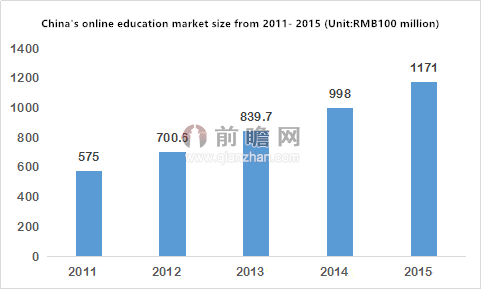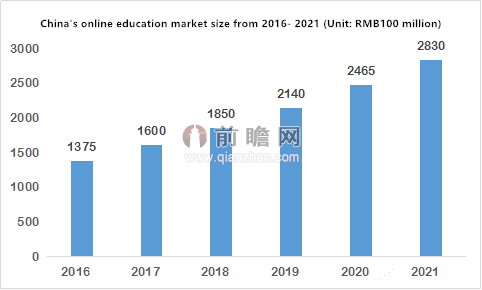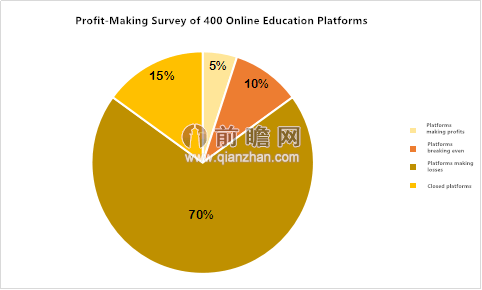Education in China has long faced issues such as uneven resource allocation, an imbalanced investment and output ratio, and low quality education level.
Online education can break through the limits of time and space, and when online education is integrated with mobile terminals, Fragmented learning can be achieved, enabling greater diversity in education. Furthermore, "Internet plus" is rapidly changing the rules of the game in the education industry. Over the next ten years, online education will take over a huge market.
Online education refers to the method of using information and Internet technology to disseminate content and develop rapid learning. Compared with traditional educational institutions, online education boasts high efficiency, convenience, lower barriers to entry, and rich teaching resources. Based on the above features and coupled with the driving force of "Internet plus", the demand for online education platforms is on the rise.
Today, in addition to New Oriental, Tomorrow Advancing Life, Xueda Education and other veteran education companies, the online education field has witnessed the arrival of Internet companies such as Baidu, Alibaba, Tencent, as well as non-Internet participants, like Datang Telecom, iFLYTEK Co. Ltd, and Talkweb Information System Co. Ltd. At a time when commercial giants, as well as a large amount of capital, are entering the online education market, a number of failed cases have emerged. According to statistics, as of December 2014, nearly 60 enterprises have closed down due problems such as unclear business models, price wars, and homogenized teaching content.
The Analysis Report on Market Outlook and Strategic Investment Planning in China’s Online Education Industry between 2016-2021, provided by Industry Research Institute Qianzhan.com, pointed out that from the beginning of 2010, the online education market and scale of the user base began to grow rapidly at a rate of more than 10%. China's online education market was worth RMB 49.11 billion in 2010 and RMB 57.5 billion in 2011. In 2014, the size of the online education market surged to RMB 99.8 billion and in 2015 it exceeded 100 billion for the first time, up to RMB 117.1 billion.

In the traditional PC era, although online education did exist, so-called genuine online education broke through in the beginning of 2011, coinciding with the expansion of the mobile Internet.
China's online education market is expected to reach RMB 137.5 billion in 2016 and RMB 160 billion in 2017. By 2019, it will break the benchmark of RMB 200 billion. By 2021, the size of the online education market will reach RMB 283 billion. At present, academic education, vocational education and language training occupy the three leading market positions, while opportunities still lie ahead for other segments of the market.

In such a favorable environment, online teachers have also made good gains. According to a media report, after a physics teacher opened paid classes on an online teaching platform, his income increased greatly. A monthly income of RMB 200 thousand or an annual income of RMB 2 million is no longer a distant dream. In addition, as other online tutors have commented, it is normal for an Internet-based teacher to earn several hundred thousand a year, with some even earning over a million.
However, in contrast with the robust market, the industry is facing profit making difficulties. As of the end of 2015, about 9,500 companies were engaged in internet education in China. After surveying 400 online education platforms, we found that only 5% of the platforms are profitable, 10% are breaking even, 70% reported losses, and 15% platforms have closed down.

Blindly relying on capital competition and the lack of a specific profit pattern have been the main reasons for the widespread losses in the online education industry. Entering into 2016, capital investment in online education has returned to a rational level, which means that funds for online education platforms will be tightened and the era of "blind money burning" will pass, leading the way for the active exploration of an effective profit-making model.
Qianzhan.com believes that online education platforms need to make breakthroughs in the following three aspects:
Firstly, they must consolidate their competitive advantages and strive to build a model integrating high-quality teachers, content, and channels of communication. Secondly, they must make effective use of big data analysis so that the insufficiencies of the platform can be understood in a timely manner and improvements can be made accordingly. This can then be used as a powerful weapon to fight against Internet piracy and the infringement of legitimate rights. Thirdly, they should focus on creative and innovative development, such as the development of wearable devices, so as to enrich teaching forms and identify new sources of income. If they can achieve the above then the future of online education platform will undergo healthy development, with a promising market outlook.
By Zheng Jiabao, Qianzhan.com